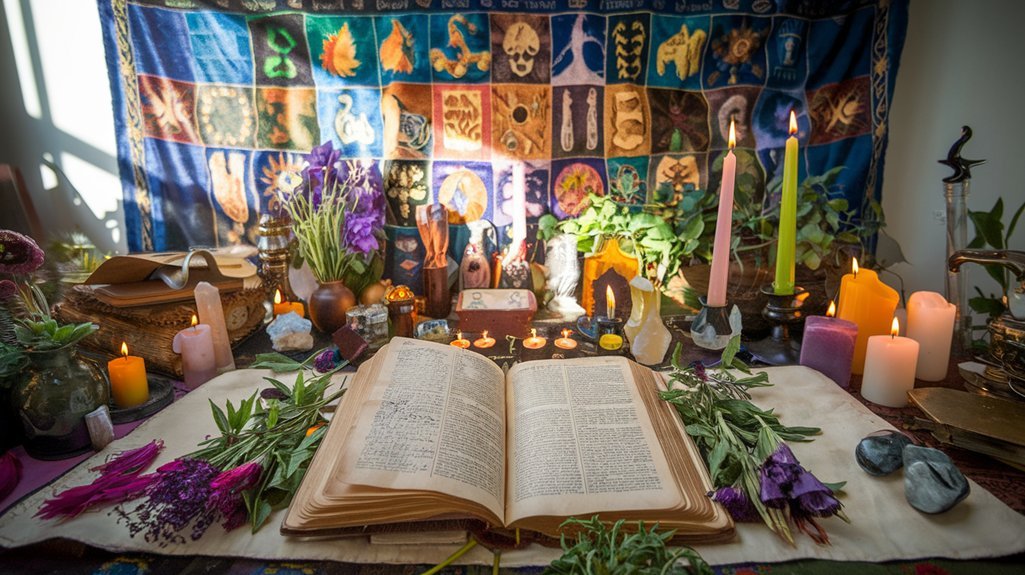As an Amazon Associate I earn from qualifying purchases.
Imagine you're exploring the foundational tenets of Wicca through the lens of Gerald Gardner's pioneering efforts in the mid-20th century. Gardnerian Wicca established a structured framework of rituals and ethics, which later inspired various offshoots like Alexandrian and Dianic Wicca. These adaptations introduced new perspectives and practices, from hierarchical structures to feminist spirituality. Today, with eclectic Wicca embracing diverse influences, you find a spiritual landscape that's both dynamic and inclusive, inviting further exploration.
Key Takeaways
- Gerald Gardner established modern Wicca, emphasizing ceremonial tools and personal responsibility under the Wiccan Rede.
- Alexandrian Wicca introduced structured hierarchy and ceremonial magic, blending multiple spiritual paths with a degree system for practitioners.
- Dianic Wicca emerged with a feminist focus, prioritizing Goddess worship and female empowerment, often excluding male participation.
- Celtic Wicca integrates ancient Celtic beliefs and deities, influencing modern practices with nature worship and seasonal celebrations.
- Eclectic Wicca allows spiritual syncretism, blending diverse traditions for personalized, interconnected practices within the community.
The Birth of Modern Wicca: Gerald Gardner's Influence
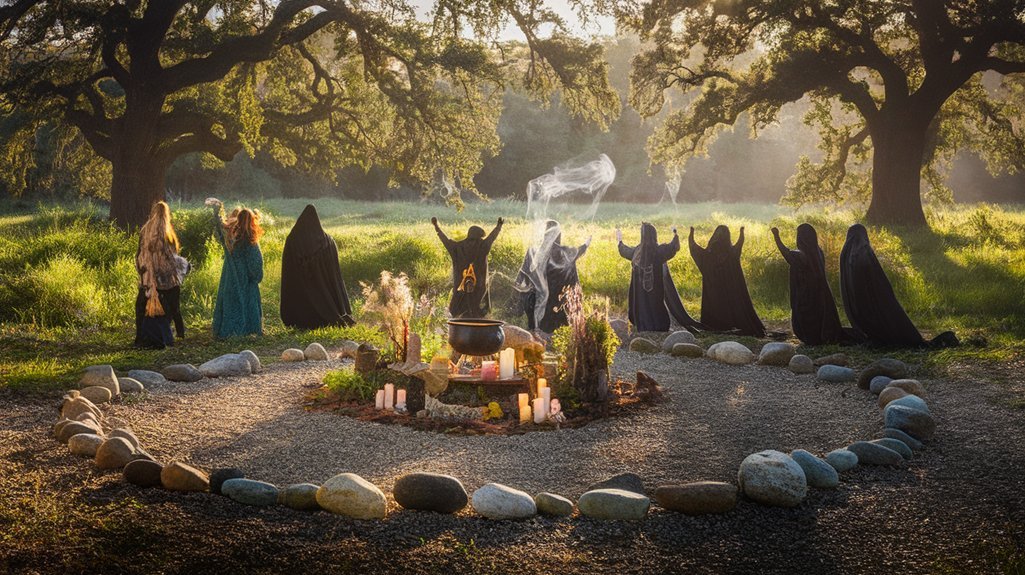
Although many factors contributed to the formation of modern Wicca, Gerald Gardner's influence remains unparalleled. As a pivotal figure, Gardner's legacy is deeply embedded in the fabric of Wiccan traditions. You can observe how traditional rituals and initiatory practices he advocated are still prevalent. These elements were carefully crafted, drawing from historical contexts and cultural influences that shaped 20th-century Britain. You'll notice Gardner's emphasis on ceremonial tools, such as the athame and chalice, which hold symbolic significance in ritual settings.
Gardner's impact extended beyond rituals to encompass Wiccan ethics, emphasizing a harmonious balance with nature and personal responsibility. His approach fostered a sense of community dynamics, encouraging practitioners to engage collaboratively while respecting individual paths. As you delve deeper into Wicca's evolution, understanding Gardner's role provides crucial insights into how these foundational aspects fostered the religion's growth and adaptation in contemporary society.
Foundational Beliefs and Practices in Gardnerian Wicca
Building upon the legacy of Gerald Gardner, Gardnerian Wicca forms a structured system of beliefs and practices that adherents follow with dedication. Central to its framework are Gardnerian ethics, which emphasize personal responsibility and the harmonious coexistence with nature. These ethics guide you to act with integrity and mindfulness, ensuring that your actions align with the Wiccan Rede's principle of "An it harm none, do what ye will."
Ritual symbolism plays a crucial role in Gardnerian Wicca, providing a rich tapestry of meaning through ceremonial tools and gestures. The use of the athame, chalice, wand, and pentacle in rituals is not merely symbolic but serves as a means to channel energies and invoke deities. By engaging with these symbols, you connect to a historical continuum, rooting your practice in the ancient traditions that Gardner sought to revive. This structured approach fosters a profound spiritual connection and community cohesion.
The Rise of Alexandrian Wicca and Its Distinct Features
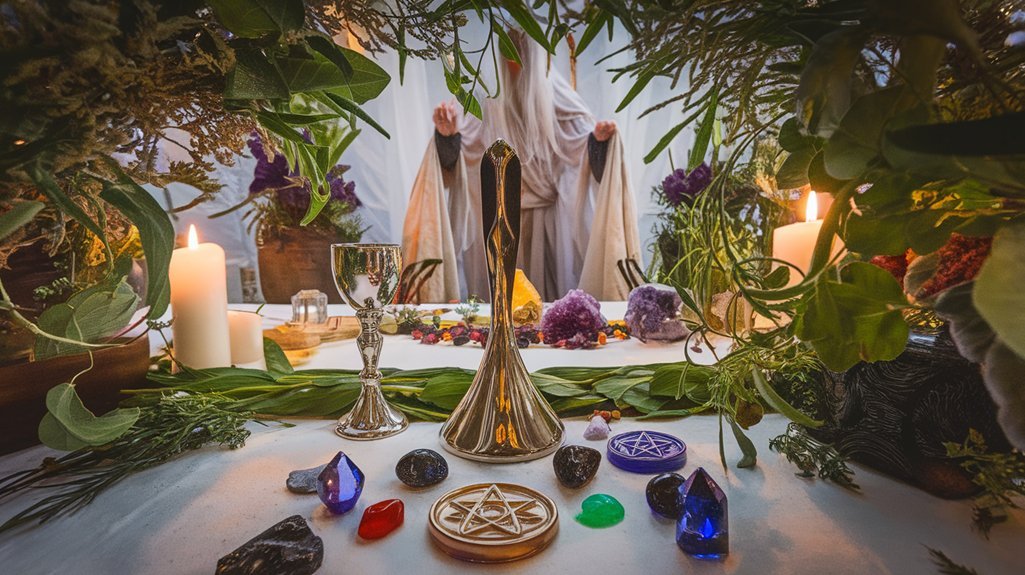
When you examine the emergence of Alexandrian Wicca, you'll notice its origins are deeply rooted in the influences of Gardnerian Wicca, yet it distinguishes itself through unique adaptations. These adaptations include a more structured hierarchical approach and elaborate rituals that emphasize ceremonial magic. By understanding the key figures and philosophical underpinnings that shaped Alexandrian Wicca, you can better appreciate its distinct contributions to modern Wiccan practices.
Origins and Key Influences
Emerging in the 1960s, Alexandrian Wicca carved its unique niche within the wider neopagan movement, stemming from the creative efforts of Alex Sanders and his wife, Maxine. You'll find that historical influences played a crucial role in its formation, drawing from ceremonial magic and the esoteric traditions of the Western world. Cultural exchanges further enriched its development, as Sanders incorporated elements from different spiritual paths, blending them into a cohesive system. This tradition reflects a respectful synthesis of ancient practices, adapted to contemporary contexts. By examining the past's diverse spiritual practices, Alexandrian Wicca not only preserved vital elements but also introduced innovative interpretations. Thus, it attracted followers seeking a dynamic, adaptable path that honors tradition while embracing change.
Rituals and Hierarchical Structure
Alexandrian Wicca, with its roots firmly planted in diverse spiritual traditions, offers a compelling ritualistic framework and hierarchical structure that distinguishes it from other Wiccan paths. You'll find that the ritual significance in Alexandrian Wicca emphasizes a blend of ceremonial magic and traditional witchcraft, creating a rich tapestry of mystical practice. Rituals are meticulously structured, fostering a deeper connection to the divine through repeated symbolic actions. Meanwhile, the hierarchical dynamics are well-defined, featuring a degree system that delineates levels of knowledge and responsibility. Initiates progress through degrees, each stage revealing more complex teachings and responsibilities. This hierarchy not only ensures the preservation of tradition but also fosters personal growth and community cohesion, setting Alexandrian Wicca apart in the broader Wiccan landscape.
The Emergence of Dianic Wicca: A Feminist Perspective
Although often regarded as a modern spiritual path, Dianic Wicca emerged in the 1970s as a distinct feminist interpretation of Wiccan traditions. This movement, rooted in feminist spirituality, prioritizes the worship of the Goddess, emphasizing female divinity and empowerment. As you explore Dianic Wicca, you'll notice its divergence from traditional Wicca, notably in its exclusive focus on the feminine aspect of the divine. By centering goddess worship, Dianic Wicca challenges patriarchal structures, offering a space where women can explore spiritual identity free from male-dominated narratives.
In Dianic rituals, you'll find an emphasis on women's experiences and empowerment, creating a unique spiritual framework that resonates with many seeking feminist spirituality. The tradition often excludes male participation, a choice that underscores its commitment to addressing gender imbalance historically present in many religious practices. Understanding Dianic Wicca involves recognizing its role in the broader feminist movement, providing spiritual solace and empowerment to women.
Exploring the Celtic Wicca Tradition and Its Roots
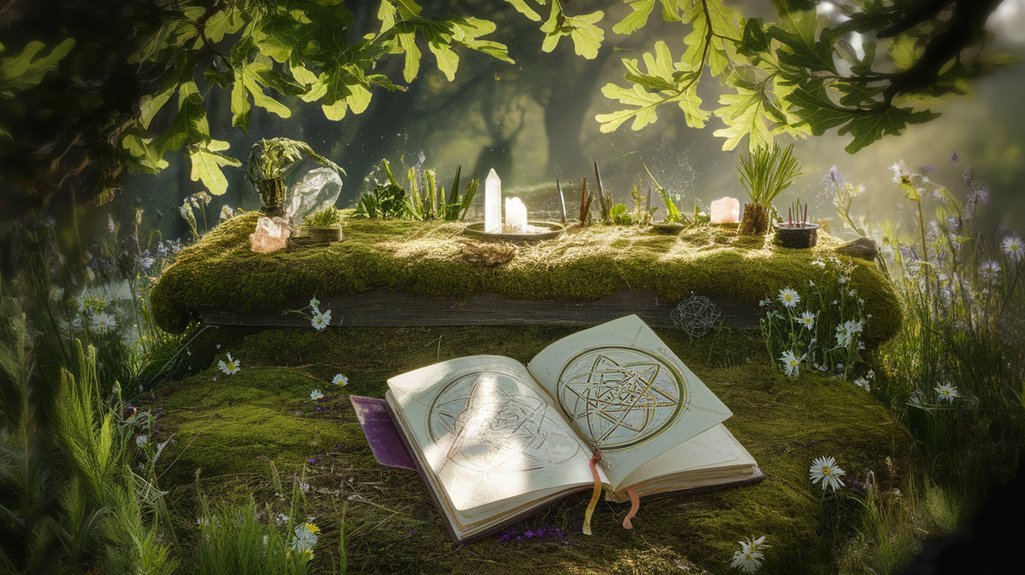
When you examine Celtic Wicca, you encounter a rich tapestry of deities and symbolism that reflect ancient Celtic beliefs and their integration into modern practices. The rituals and seasonal celebrations, rooted in the Celtic calendar, highlight their enduring influence on contemporary Wiccan traditions. By understanding these elements, you can appreciate how they shape and enhance the spiritual framework of today's practitioners.
Celtic Deities and Symbolism
Delving into Celtic deities and symbolism within the Wiccan tradition unveils a rich tapestry of mythological figures and spiritual motifs that form the backbone of Celtic Wicca. In this framework, Celtic mythology is alive with deity representation, where gods and goddesses embody the elemental forces of nature. The symbolic significance of sacred groves and nature spirits underscores the connection to the natural world, often serving as settings for ancestral worship and ritual offerings. Mythical creatures like the Sidhe, intertwined with seasonal festivals, deepen your spiritual journey. The emphasis on Goddess worship reflects a reverence for the divine feminine. The synthesis of these elements provides a profound understanding of how Celtic Wicca honors its ancient roots while adapting to contemporary spiritual needs.
Rituals and Seasonal Celebrations
Building on the rich tapestry of Celtic deities and symbolism, the rituals and seasonal celebrations in Celtic Wicca provide a dynamic framework through which practitioners engage with the cyclical rhythms of the earth. You'll find that these rituals are deeply intertwined with the natural world, reflecting the changing seasons and lunar phases. Seasonal rituals, such as Samhain and Beltane, honor the transition between life and death, fertility and harvest, connecting you to ancient agricultural cycles. Lunar celebrations, often observed during the full moon, allow you to attune to the moon's energy, fostering introspection and renewal. By participating in these practices, you immerse yourself in a rich tradition that emphasizes harmony with nature, enhancing your spiritual journey through the Celtic lens.
Influence on Modern Practices
Though often seen as a mystical and ancient tradition, Celtic Wicca profoundly influences modern spiritual practices by integrating its core elements of nature worship, deity veneration, and ritual structure into contemporary contexts. You see this influence reflected in community practices where groups incorporate Celtic symbols and deities into their rituals, fostering a shared spiritual environment. These communal activities often emphasize seasonal cycles, echoing ancient Celtic festivals.
On a more individual level, personal interpretations of Celtic Wicca allow practitioners to adapt its elements to their unique spiritual journeys. You might notice how individuals blend Celtic deities with elements from other traditions, creating an eclectic approach that resonates personally. Such flexibility in practice underscores the dynamic evolution of Wiccan paths, emphasizing both community connection and personal spirituality.
Eclectic Wicca: Blending Diverse Spiritual Influences
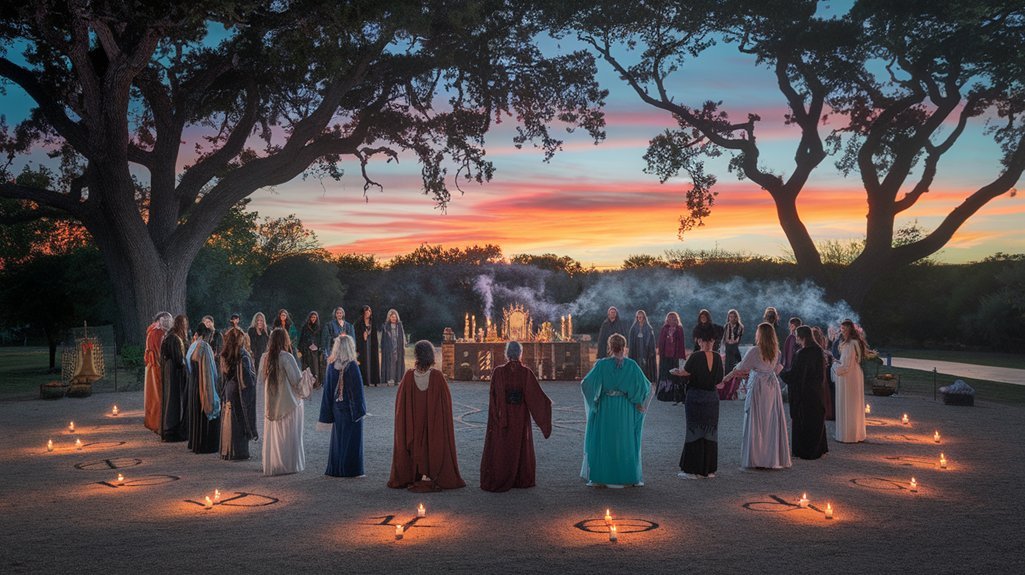
Eclectic Wicca, a dynamic and personalized path within the broader Wiccan tradition, thrives on the integration of varied spiritual influences, offering practitioners the flexibility to craft a unique spiritual journey. By engaging in eclectic practices, you embrace spiritual syncretism, drawing from diverse influences such as Celtic, Norse, or Eastern philosophies. This approach allows for a personal path that diverges from strict adherence to a single tradition, enabling you to blend traditions and create a practice that resonates personally.
Community engagement becomes vital as you share and learn from others who explore similar eclectic paths. Ritual adaptation is crucial, as you might modify traditional Wiccan rites to incorporate elements from other spiritual systems. This often involves symbolic interpretation, where symbols from multiple traditions are harmonized, creating a cohesive spiritual framework. Thus, Eclectic Wicca encourages a rich tapestry of beliefs, fostering a deeply individual yet interconnected spiritual practice.
The Impact of the Internet on Wiccan Communities
You can see how the internet has transformed Wiccan communities by facilitating online ritual sharing, which allows practitioners to exchange and preserve diverse spiritual practices. Virtual coven connections enable you to form and maintain meaningful relationships with fellow Wiccans across geographical boundaries, promoting a sense of unity and shared purpose. This digital shift not only democratizes access to Wiccan knowledge but also challenges traditional notions of physical gatherings and localized practice.
Online Ritual Sharing
As digital technology continues to evolve, the impact of the internet on Wiccan communities is both profound and multifaceted, particularly in the realm of online ritual sharing. You can now partake in digital gatherings where participants across the globe unite for online ceremonies. These virtual interactions allow for a unique expression of rituals, offering accessibility that traditional settings might lack. Through platforms like social media and video conferencing tools, you can witness and contribute to a diverse array of practices. This digital shift doesn't only preserve traditional rites but also fosters the development of new, eclectic paths. The internet thus acts as a conduit, expanding the ways you engage with and understand Wiccan spirituality, enhancing both personal and communal experiences.
Virtual Coven Connections
While the internet has profoundly impacted various aspects of life, its influence on Wiccan communities is particularly significant through the formation of virtual coven connections. These digital covens offer a platform for global networking, allowing practitioners to partake in virtual gatherings and remote ceremonies. You'll find that online rituals and virtual workshops foster inclusivity, bridging geographical distances. Social media connections further enhance this internet community, creating spaces for exchange and support.
- Virtual gatherings allow Wiccans to meet despite physical distances.
- Online rituals provide accessible means for collective spiritual practice.
- Digital covens enable the sharing of diverse traditions and ideas.
- Remote ceremonies maintain the sanctity and relevance of rituals in changing times.
These tools strengthen Wiccan practices, creating a resilient, interconnected community.
The Role of Rituals and Ceremonies in Modern Wicca
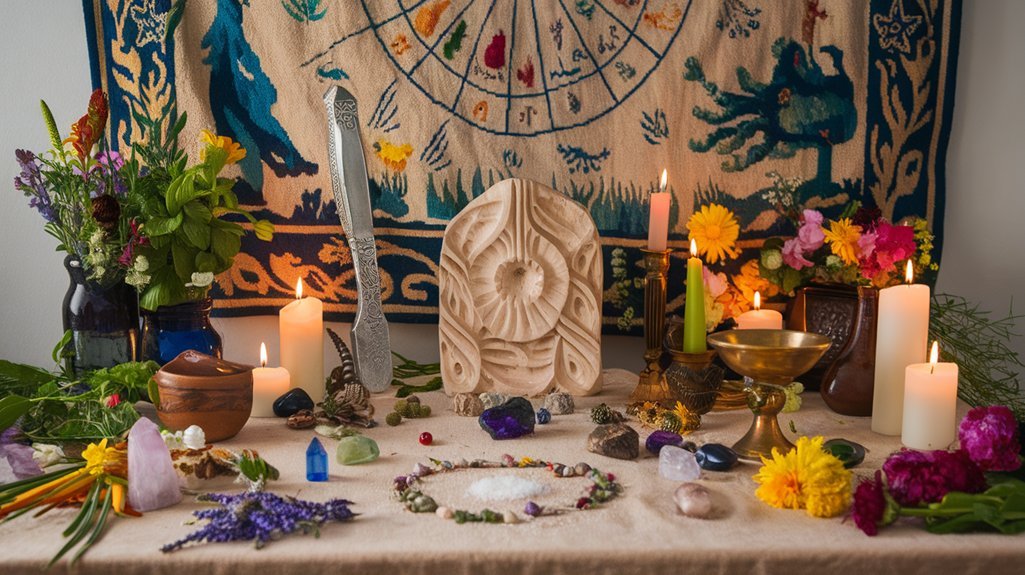
Rituals and ceremonies in modern Wicca serve as vital components that connect practitioners to the spiritual and natural worlds. You'll find that these rituals hold significant meaning, acting as a conduit for spiritual growth and community bonding. The ritual significance in Wicca can't be overstated, as it anchors practitioners in tradition while allowing for personal expression. Over time, ceremonial evolution has enriched these practices, blending influences and adapting to contemporary needs.
| Aspect | Description |
|---|---|
| Ritual Tools | Athame, chalice, pentacle, wand. |
| Seasonal Festivals | Sabbats: Samhain, Beltane, etc. |
| Moon Rituals | Esbats: Celebrations of the lunar cycles. |
| Personal Rituals | Tailored ceremonies for individual intentions. |
| Community Ceremonies | Group rituals fostering collective spiritual energy. |
Nature Reverence and Environmentalism in Wiccan Beliefs
In exploring the vibrant tapestry of Wiccan traditions, one discovers that reverence for nature forms a cornerstone of its belief system. As an adherent of earth-centered spirituality, you engage in eco-conscious practices and nature-based rituals that emphasize sustainable living and environmental activism. Wiccans often regard sacred natural spaces, like forests and rivers, as temples deserving respect and protection.
Your commitment might include:
- Green witchcraft, which integrates herbalism practices to heal and nurture both people and the planet.
- Wildlife conservation, ensuring the protection and appreciation of diverse animal species as part of the Earth's ecosystem.
- Planetary health initiatives, aiming to balance human needs with ecological sustainability.
- Participation in environmental activism, advocating for policies that safeguard the environment.
The Future of Wicca: Trends and Transformations
As Wicca evolves in the modern era, its adaptability and openness to change become increasingly evident, shaping its future trajectory. Future practices will likely integrate technological innovations, leading to digital rituals that connect practitioners globally, enhancing community engagement. Generational shifts promise fresh perspectives, driving inclusivity efforts and challenging cultural appropriations, ensuring Wicca remains relevant and respectful. Environmental activism continues as a pivotal element, with practitioners advocating for ecological sustainability, influencing societal impacts.
| Aspect | Transformation |
|---|---|
| Future Practices | Incorporation of digital rituals |
| Community Engagement | Strengthened by global connectivity |
| Environmental Activism | Central to advocacy and ecological impact |
| Inclusivity Efforts | Addressing cultural appropriations |
| Technological Integration | Facilitating modern ritualistic practices |
With global perspectives, Wicca's fluid nature will adapt to diverse cultural contexts, fostering a more inclusive spiritual path. By embracing these transformations, you can ensure that Wicca remains a vibrant, evolving tradition with profound societal impacts.
Frequently Asked Questions
How Do Wiccans Celebrate Seasonal Festivals Like Beltane or Samhain?
You celebrate Beltane with rituals focusing on fertility and fire, symbolizing life's renewal. During Samhain, you offer tributes to ancestors, acknowledging the veil's thinning. Both festivals embrace cycles of death and rebirth, fostering spiritual connection.
What Role Do Tools Like Athames or Wands Play in Wiccan Rituals?
In Wiccan rituals, tools like athames and wands act as symbolic keys unlocking mysteries. They hold ritual significance, channeling energy and intention. Athames represent air or fire, while wands embody willpower, directing spiritual focus and transformation.
How Do Wiccans Typically Structure Their Coven Meetings?
You'll find that coven meetings often follow a structured format, incorporating rituals like casting circles, invoking deities, and performing seasonal celebrations. This coven structure strengthens group unity and enhances the spiritual experience for each member.
What Are the Common Misconceptions About Wicca in Popular Culture?
Don't judge a book by its cover. You often find Wiccan stereotypes and magic misconceptions in popular culture, portraying them as malevolent or fantastical. These misrepresentations ignore Wicca's genuine focus on nature, harmony, and personal growth.
How Do Wiccans Approach Issues of Ethics and Morality in Their Practice?
You'll find Wiccans navigate ethical dilemmas using personal moral frameworks, often guided by the Wiccan Rede and the Threefold Law. These principles encourage actions that avoid harm and promote positive energy, fostering an ethical, mindful practice.
Conclusion
As you've explored the evolution of Wiccan traditions, it's clear that they continue to adapt and thrive. Did you know that a 2021 survey revealed that over 1.5 million Americans identify as Wiccan or Pagan? This growth underscores Wicca's dynamic nature, embracing diverse influences and modern values. By integrating personalized practices and ancient wisdom, you've witnessed how Wicca fosters a vibrant, inclusive spiritual community, reflecting both individual beliefs and collective reverence for nature and the divine.
Amazon and the Amazon logo are trademarks of Amazon.com, Inc, or its affiliates.


